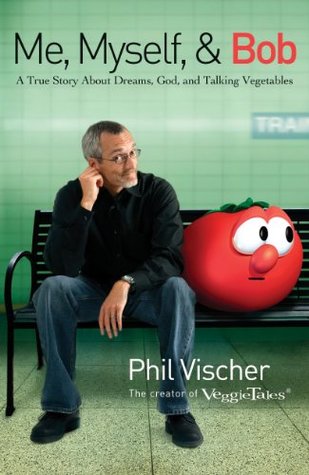More on this book
Community
Kindle Notes & Highlights
by
Phil Vischer
Read between
May 31 - June 10, 2018
My great-grandfather on my father’s side attended A. W. Tozer’s church in Toledo and occasionally hosted the now famous pastor-author in his home on Sunday afternoons for dinner and rousing theological discussions.
My great-grandfather on my mother’s side was a pioneering radio preacher, the Reverend R. R. Brown of Omaha, Nebraska.
Today R. R. Brown’s picture is one of the few that hangs in both the National Religious Broadcasters Hall of Fame and the National Broadcasters Hall of Fame.
that I entered the world on June 16, 1966—or 6-16-66—a date that would make other very religious folk look at me slightly askew, as if they might need to keep an eye on this one.
we wanted to make videos that weren’t just good “for Christian videos,” but were good for any videos.
But VeggieTales was, as far as I know, the world’s first CGI home video series and the first CGI series of any kind produced in the United States.
He believes that in both cases the rapid expansion of these “epidemics” was not merely due to the fact that a certain number of people had become “infected” and therefore could spread the word (or the virus), but rather that certain types of people had become infected—people who traveled in broad circles and exerted significant social influence. According to Gladwell’s theories, it isn’t just that people start talking about a product, it’s that the right people start talking about a product.
I decided that probably wasn’t the solution God had in mind. (Moments earlier I had walked right past Michael Eisner and Miramax chief Harvey Weinstein.
The real question to ask in any failure, of course, isn’t “Who should we blame?” but rather “What did we learn?”
Thing I Learned #1: Never lose sight of the numbers.
Financial resources are like teeth—ignore them and they’ll go away. Ignore your health and you’ll go away. Just as dead men make lousy ministers, dead organizations make lousy ministries.
In hindsight, perhaps the simplest explanation for the failure of Big Idea Productions is this: I never found my Roy.
That would be Roy Disney. Roy was Walt's brother who kept his eyes on the finances so that Walt could focus on the creative end. Roy's oversight also occasionally helped to rein in Walt .
Love. Mutual submission. It all sounds very Christian, and, amazingly, seems to be the key to successful, long-term organizations. Amazing ideas come to life when people with complementary gifting devote themselves selflessly to each other, not for their own success, but for the success of the idea.
Thing I Learned #2: Ignore the voice that says, “You deserve it.”
Thing I Learned #3: If you successfully identify a need and create a product that meets it in a unique way, you are the expert.
Thing I Learned #4: Know yourself.
Thing I Learned #5: Bigger is no longer better.
Thing I Learned #6: If I had it to do all over again, I would let my business model determine my pay scales.
Thing I Learned #7: Build a team that rows in the same direction.
God did not kill Big Idea. I never for a second blamed God for the collapse of my dream. I dusted the body for fingerprints, and they were all mine.
“Only one life, ‘twill soon be past—only what’s done for Christ will last.”
“God can’t steer a parked car.”
The generic suburban evangelicals kept organizing the prayer meetings, but the real praying never started until the Pentecostals showed up.
C. S. Lewis said, “He who has God plus many things has nothing more than he who has God alone.”
“If God gives you a dream, and the dream comes to life and God shows up in it, and then the dream dies, it may be that God wants to see what is more important to you—the dream or him. And once he’s seen that, you may get your dream back. Or you may not, and you may live the rest of your life without it. But that will be okay, because you’ll have God.”
“We have no business telling God what we want to accomplish for him or dreaming up what we want to do for him.” And “The people of God are not to be a people of vision; they are to be a people of revelation.”
The problem with the saying “God can’t steer a parked car” is that, while it’s cute, it isn’t biblical. When people of great faith in the Bible don’t know what God wants them to do, they don’t just run off and make stuff up. They wait on him.
The Christian life wasn’t about running like a maniac; it was about walking with God. It wasn’t about impact; it was about obedience. It wasn’t about making stuff up; it was about listening.
when God needed someone at a specific time in history to advance his will in a specific and dramatic way, he knew who to call, because he knew who was listening.
First, God loves you. Not because of what you can do, or even because of what you can become if you work really, really hard. He loves you because he made you. He loves you just the way you are. He loves you even when you aren’t doing anything at all. We really shouldn’t attempt to do anything for God until we have learned to find our worth in him alone.
Second, when it is time to do something for God, and that time will come quickly if you’re listening, don’t worry about the out-come.
That’s his job. Your responsibility is simply to ...
This highlight has been truncated due to consecutive passage length restrictions.
The impact God has planned for us doesn’t occur when we’re pursuing impact. It occurs when we’re pursuing God.


